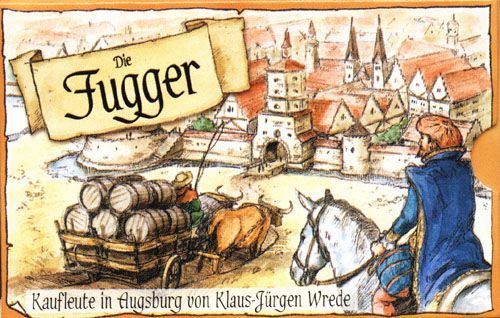Die Fugger (2003) Board Game
Die Fugger is a board game released in 2003, designed by Alexander Jung and published by Adlung-Spiele. The game is set in the medieval era and revolves around players taking on the role of merchants from the influential Fugger family. The Fugger family was a prominent German banking and merchant dynasty that rose to power in the 15th and 16th centuries, known for their wealth and influence in European trade.
Game Components of Die Fugger
How To Setup Die Fugger
To set up the game, place the price wheel in the middle of the table and set each of the five goods at the “5” value. Fold the goods value cards in half to stand them up. Jakob Fugger is placed near the center of the table and given two face-up goods. Each player receives four cards to start the game.
Gameplay Mechanics and Game Objective
Player Experience
Die Fugger offers a quick and tactically engaging experience, with meaningful choices in every turn. The game’s model of supply and demand adds a layer of brinkmanship, where players must balance their strategies to avoid severe price drops. The game also allows for tactical collusion and spoiler plays, making it interactive and tense.
Pros
Cons
Personal Thoughts on Die Fugger
Die Fugger is ideal for players who enjoy economic and logistical games with a touch of strategy. It’s a great filler game that offers meaningful choices and quick gameplay, making it suitable for those who appreciate tactical manipulation and brinkmanship. However, it might not appeal to players seeking a more thematic or narrative-driven experience. If you’re looking for a game that’s easy to learn but offers depth in economic strategy, Die Fugger is a solid choice.
We are supported by our audience. When you purchase through links on our site, we may earn an affiliate commission, at no extra cost for you. Learn more.

